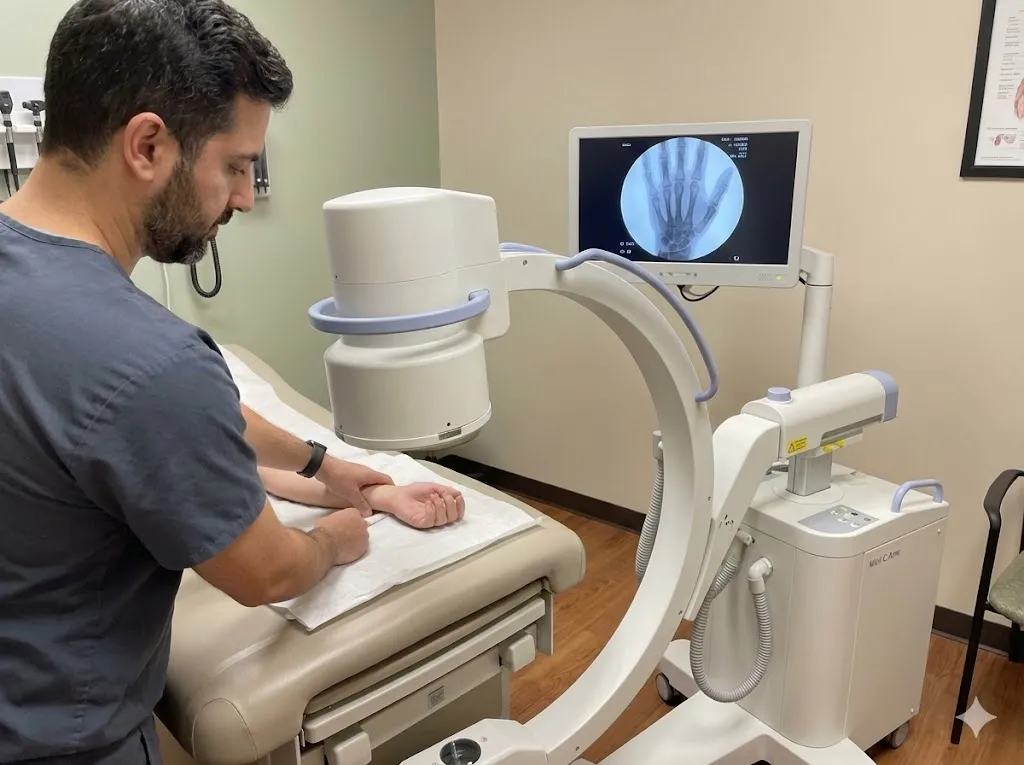A herniated disc can be painful and frustrating. It might take simple tasks like walking, sitting, or even sleeping uncomfortable. The good news is that most herniated discs heal on their own with time and proper care. But how long does it actually take to recover? In this blog, we will answer this in the simplest way possible, along with the signs that show that you are on the right track! So, just relax and read on.
What Is a Herniated Disc?
A herniated disc happens when the soft part inside a spinal disc pushes out through a crack. Your spine has many discs that act as cushions between the bones. These discs help you move and absorb shock. But when a disc gets damaged, it can press on nerves, causing pain, weakness, or numbness.
A herniated disc is also called a slipped disc or bulging disc. It can happen anywhere in the spine but is most common in the lower back or neck.
How Long Does It Take for a Herniated Disc to Heal?
The healing time for a herniated disc usually depends on the severity of the condition and how well your body responds to the treatment. Some people can recover within 2-3 weeks but some may take around 3-6 weeks to recover completely.
Here’s a general timeline for the recovery process:
-
Acute inflammation (first few weeks to 2 weeks): Pain, swelling, and stiffness are at the worst. The body starts the healing process by reducing inflammation. Rest, ice/heat therapy, pain medications, and avoiding strain help manage symptoms.
-
Subacute phase (2-6 weeks): Pain begins to subside and mobility improves. Physical therapy, gentle stretching, and core strengthening exercises can help. Staying hydrated and eating anti-inflammatory foods can support recovery.
-
Tissue Repair and Strengthening (6 Weeks to 3 Months): The disc continues to heal, and most mild to moderate cases experience significant pain relief. Strengthening exercises, posture correction, and controlled movement aid in restoring function and preventing further injury.
-
Chronic Phase (3 to 6 Months or More for Severe Cases): Recovery may slow, and some discomfort may persist. If symptoms continue, advanced treatments such as steroid injections, chiropractic care, or surgery might be necessary.
|
Research Insight: According to the National Center for Biotechnology Information (NCBI), 90% of symptomatic herniated disc cases resolve within 6 weeks of injury. |
6 Signs That Your Herniated Disc Is Getting Better
Healing from herniated discs can take time but there are some clear signs and symptoms that indicate improvements. Here’s how you can check if you are on the right track:
-
Less pain and discomfort: if you are feeling less pain and discomfort, it’s a good sign that your disc is healing.
-
Improved mobility: you may notice easiness in walking, twisting, and walking without any discomfort or stiffness.
-
Reduced numbness or tingling: if you were experiencing numbness and tingling sensations that are gradually fading.
-
Better sleep or daily activities: if you can sleep more comfortably and perform regular activities with less pain, your body is healing.
-
Increased Strength: As your muscles regain strength, you will feel more stable and experience less fatigue in your back or legs.
-
Less Dependence on Pain Medications: Needing fewer pain relievers means your body is recovering naturally.
Can a Herniated Disc Heal on Its Own?
Yes, most herniated discs heal naturally, but it depends on the severity of the condition. In mild to moderate cases, the body can reabsorb the leaked disc material over time, reducing pressure on the nerves. This process may take around 2-3 weeks to 6 months. During this time, rest, physical therapy, pain management, and sitting posture can help better healing.
Many people find relief with simple treatments like heat therapy, light stretching, and anti-inflammatory medication. However, if the pain does not improve or worsens, medical treatments such as steroid injections or surgery may be needed.
Staying active with low-impact exercises, avoiding heavy lifting, and maintaining a healthy weight can also support healing. If symptoms last longer than three to six months or make daily activities difficult, consulting a doctor is the best step.
Some people see their herniated disc completely disappear over time:
Source: (pubmed.ncbi.nlm.nih.gov) |
What Slows Down Healing? Avoid These Mistakes!
Recovering from a herniated disc takes time, but certain habits can slow the process. If you want to heal faster, watch out for these common mistakes:
-
Slouching All Day – Poor posture puts extra pressure on your spine, making it harder for your disc to heal. Sit up straight and use back support!
-
Too Much Rest – While lying down might feel good, staying inactive for too long can stiffen your muscles and slow recovery. You should do gentle stretching and brisk walking frequently.
-
Lifting Heavy Stuff – Picking up heavy objects, even grocery bags, can strain your spine. Avoid lifting anything that makes your pain worse.
-
Extra Weight on Your Spine – Being overweight adds stress to your back, making healing harder. Light exercise and a balanced diet can help take the pressure off.
-
Ignoring Pain – If your pain isn’t improving or is getting worse, don’t wait—talk to a doctor before it turns into a bigger problem.
-
Bad Lifestyle Choices – Smoking, poor diet, and dehydration slow down tissue repair. Eating healthy and staying hydrated can help your body heal naturally.
Small changes can make a big difference in your recovery. Listen to your body and give it the care it needs!
10 Best Ways to Speed Up Recovery
-
Stay Hydrated – Drink plenty of water to flush out toxins and keep your body functioning optimally.
-
Get Enough Sleep – Rest is crucial for healing and muscle repair. Aim for 7-9 hours of quality sleep.
-
Eat Nutrient-Rich Foods – Include protein, vitamins, and antioxidants to support faster recovery.
-
Move Gently – Light stretching or walking can improve blood circulation and reduce stiffness.
-
Use Ice or Heat Therapy – Ice reduces swelling, while heat relaxes muscles and improves blood flow.
-
Manage Stress – High stress can slow recovery. Practice deep breathing or meditation.
-
Stay Consistent with Medications – Follow your doctor's advice and take medications as prescribed.
-
Get Sunlight – Vitamin D boosts immunity and aids in faster recovery.
-
Limit Alcohol and Smoking – These can slow down the healing process and weaken immunity.
-
Listen to Your Body – Rest when needed and avoid pushing yourself too hard.
Do You Need Surgery for a Herniated Disc?
No. In most cases, a herniated disc does not require surgery. Many people recover with home treatments like rest, physical therapy, pain medication, and lifestyle changes. The body often heals on its own within a few weeks to months.
However, surgery may be needed in these cases:
-
Severe or persistent pain: If you are experiencing persistent pain and it does not improve after 3 to 6 months of treatment, surgery might be an option.
-
Persistent weakness or numbness: If you experience muscle weakness, loss of feeling, or difficulty walking, it may indicate nerve damage that requires surgical treatment.
-
Loss of Bladder or Bowel Control: This is a medical emergency and requires immediate surgery.
Common Surgeries for Herniated Discs:
Surgical options include microdiscectomy (removing part of the damaged disc) or spinal fusion (stabilizing the spine). Fortunately, these procedures are often minimally invasive, with shorter recovery times.
No need to worry about surgery, here’s how these surgeries are performed:
1. Microdiscectomy
-
First of all, you will be sedated under anesthesia (local or general anesthesia).
-
The doctor will make a small cut (1-2 inches) near the affected area.
-
The surgeon moves muscles and tissues carefully to reach the herniated disc.
-
Then the doctor will remove the pressed nerve to relieve pain and discomfort.
-
Then the part of the skin is stitched back into place with a bandage.
-
After completing the procedure, the patient may be sent home the same day or the next for the rest.
2. Spinal Fusion
-
The doctor gives medicine to make you sleep so you don’t feel pain.
-
A small cut is made near the spine.
-
The doctor removes the damaged part of the disc between the bones.
-
A small piece of bone (natural or artificial) is placed between the spine bones.
-
Screws, rods, or plates are used to keep the spine stable.
-
The doctor stitches the skin back and puts a bandage on it.
-
The patient rests, avoids heavy work, and may do therapy to heal properly.
|
Final Thoughts: Be Patient, Healing Takes Time
So, how long does a herniated disc take to heal? Well, as we learn in the article, healing from a herniated disc takes time, but with the right care, most people feel better in a few weeks or months. Listen to your body, follow your doctor’s advice, and don’t rush the process. If your pain gets worse or you notice serious symptoms, don’t wait—see a doctor. Your health matters, and the right steps today can help you move pain-free again soon!
अक्सर पूछे जाने वाले प्रश्नों
What is the fastest way to heal a herniated disc?
The fastest healing typically comes from a combination of rest, physical therapy, anti-inflammatory medication, and proper posture, though severe cases may require surgical intervention.
Do you ever fully recover from a herniated disc?
Yes, many people fully recover from herniated discs with proper treatment and time, however, others may experience some lasting effects depending on the severity, location, and individual healing factors.
Is walking good for a herniated disc?
Yes, walking is generally considered beneficial for most herniated discs as it promotes blood flow and healing, but should be done carefully with physician guidance and stopped if it increases pain.
How to sleep with a herniated disc?
To sleep with a herniated disc, lie on your back with a pillow under your knees or on your side with a pillow between your knees to maintain proper spinal alignment.
How do I know if my herniated disc is severe?
Watch out for symptoms such as intense pain, numbness, weakness in limbs, loss of bladder/bowel control, or difficulty walking—consult a healthcare provider immediately for proper diagnosis.
लेखक





